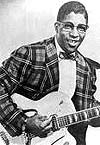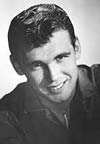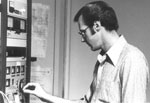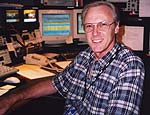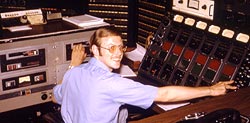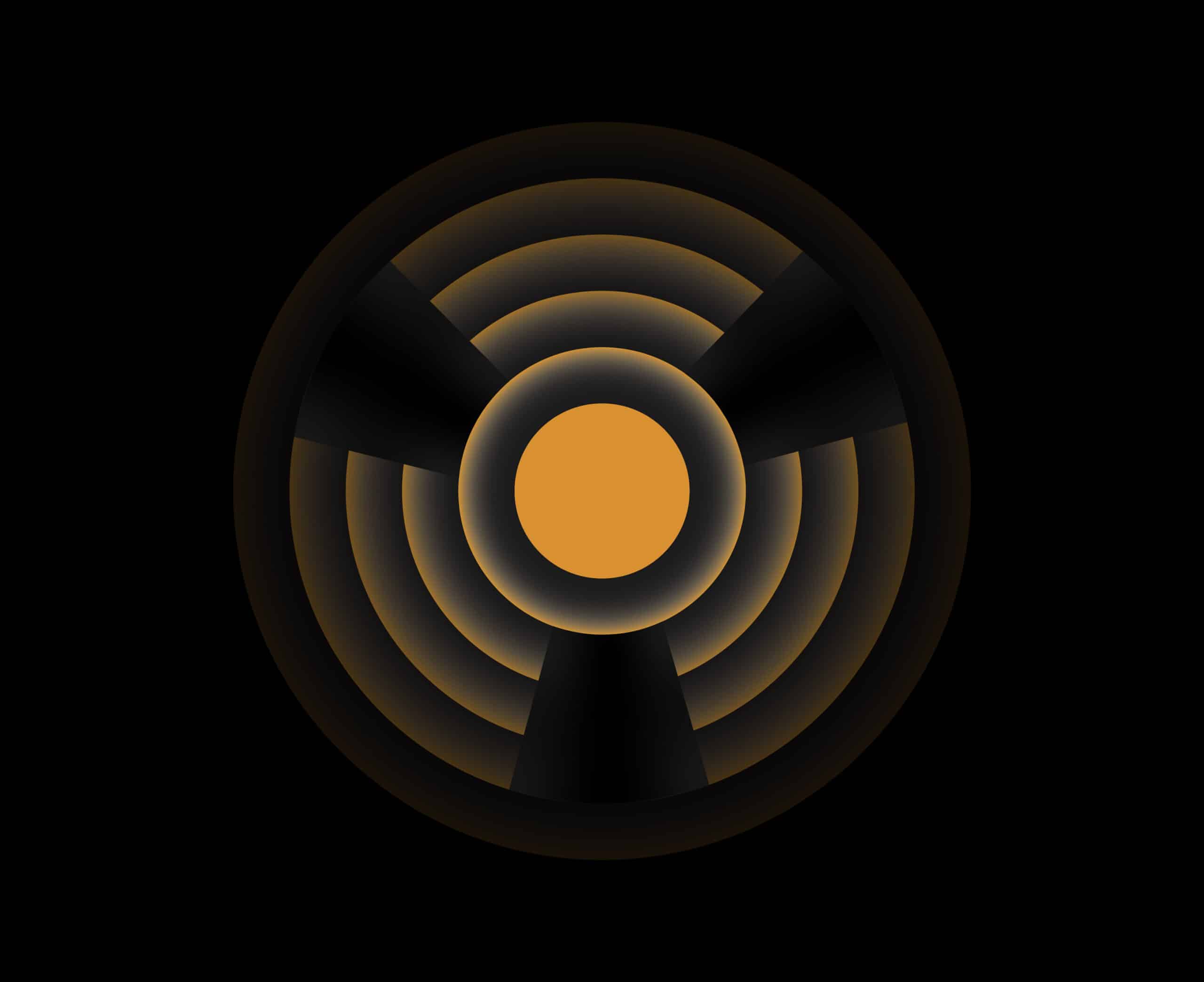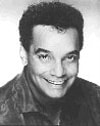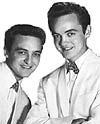The Don Kent Collection
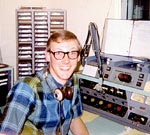
Don on Oldies-formatted KWIZ, 1967 
Don Kent on the board at KNX, 1972
|
Don Kent graduated high school in early 1964 and writes:"I had NO idea what career path to take. During my Senior Year I browsed through several college catalogs and came across "broadcasting" at Los Angeles City College. That sounded like fun. Besides, my dad had been in radio during WWII and it was sort of like following in his footsteps; well, kinda! I did pretty well at it, getting straight A's and a place on the Dean's List, so I figured that I'd found my "calling".
Back in those days I collected a bunch of aircheck tapes from my, then, favorite stations. I studied the techniques for school, but I just liked listening to them, too. Eventually, I connected with others who had done the same and we traded. While I was still in school I took a job doing the news part-time at KBLA in Burbank, CA. That was in 1965. It worked into a job offer from KWIZ AM/FM, Santa Ana, which, so far as I know, was the first all-oldie station anywhere. That ended in 1969 and I returned to the station in Burbank, which was now KBBQ (Country). I HATED the Country format, but by then I had a wife and son and I needed the job (didn't have to turn the monitor up, though!). The P.D. from KLAC, Los Angeles, heard me on the air and offered me a job at his station. Needless to say, I took it. After several months I switched over to the Engineering Department there. The station was co-housed with KMET-FM and I did Production-Engineering for both. In 1970 I moved over to KFWB, Los Angeles, as a Production Engineer. A couple of years later I briefly moved to KNX/CBS but didn't much care for it and returned to KFWB, where I stayed until 1979. That's when I moved over to television, where I did freelance audio work (common in that business) for a short time. That led to a staff offer from KTLA-TV in 1980. I started there doing "doofus work", but moved up the ladder to the position of Senior Engineer and later Crew Chief. Since moving to television my aircheck interests switched to restoration of early videotape recordings. I did all the restorations for the UCLA Film and Television Archive between about 1987 and 2002. In 1988 I won a Primetime Emmy for restoring the earliest television show recorded on color tape; "An Evening With Fred Astaire" (1958). Since then I have done several others, including The Nixon-Krushchev "Kitchen Debate" for the Library of Congress. I'm real proud of how those early shows turned out. Many years ago I collected rock 'n' roll records, but the "sound" changed from what I liked and I hung that up. I still have about three thousand records from back then though. In the intervening years since college, I just put those old aircheck tapes on a shelf in the garage. I haven't listened to them since the early 70's but they still sound pretty good, so enjoy! |
The Repository thanks Don Kent for sharing!
Unscoped
It starts with a Jack Morris newscast. Gary Owens sounded pretty good here, in the early part of his career. This is the earliest example of KEWB I’ve heard.Gary Owens
[Uncle Ricky notes:]
This aircheck is an absolute treasure. If Wink Martindale’s Deck of Cards isn’t enough, you’ll enjoy the Clinton S. Feamish Tap-Dancing Weather and The Thing that attacked downtown Milpitas

Scoped
[Description by Uncle Ricky from notes by Don Kent]
This recording doesn’t offer the best fidelity, but it is a rare piece of Los Angeles radio history. It’s a pre-produced 90-minute special highlighting many of the 1962 songs nominated for the 5th Annual Grammy Awards in May, 1963.
Unfortunately, there are some technical issues. A lot of hum was removed (some remains), but despite best efforts, there’s a high hiss level, some cross-talk from an unknown adjacent station, and some speed variations. There was also at least one record off-center on the original broadcast!
The show is hosted by the KFWB disc jockeys, including Bill Ballance, Wink Martindale, Elliot Field, Joe Yokam, Gene Weed, Sam Riddle, Jimmy O’Neill and Program Director Jim Hawthorne. The aircheck opens and closes with a Cleve Herman newscast.
Unscoped
[Description by Uncle Ricky from notes by Don Kent]
This recording doesn’t offer the best fidelity, but it is a rare piece of Los Angeles radio history. It’s a pre-produced 90-minute special highlighting many of the 1962 songs nominated for the 5th Annual Grammy Awards in May, 1963.
Unfortunately, there are some technical issues. A lot of hum was removed (some remains), but despite best efforts, there’s a high hiss level, some cross-talk from an unknown adjacent station, and some speed variations. There was also at least one record off-center on the original broadcast!
The show is hosted by the KFWB disc jockeys, including Bill Ballance, Wink Martindale, Elliot Field, Joe Yokam, Gene Weed, Sam Riddle, Jimmy O’Neill and Program Director Jim Hawthorne. The aircheck opens and closes with a Cleve Herman newscast.
Scoped
This recording of the late Gene Weed is a continuation of the afternoon show above, after the announcement of WB’s format change.
We hear the station evolving from Top 40 to M.O.R. It wasn’t the best in town at either! Here’s a typical show, regardless of the impending change.
George Dvorak and Beach Rogers are featured with news.
Unscoped
Scoped
[Uncle Ricky notes:]
This aircheck is an absolute treasure. If Wink Martindale’s Deck of Cards isn’t enough, you’ll enjoy the Clinton S. Feamish Tap-Dancing Weather and The Thing that attacked downtown Milpitas

Our host is Robert W. Morgan. This hour features music and commentary focused around 1962, but there is a dance song composite that covers over a decade. Comments are included from Dick Clark, Carole King and Neil Sedaka.
This was the first “Rockumentary”, produced by KHJ Program Director Ron Jacobs. Following the unprecedented success of this legendary broadcast, Jacobs left KHJ later that year. RKO made the show available to the other stations in their group, narrated by station-specific talent. When RKO was done with it, Drake-Chenault offered a re-recorded version in syndication three times between 1970 and 1982. An edited version (no jingle) of the last release, narrated by Bill Drake, was still in syndication as of 2006.
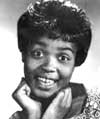
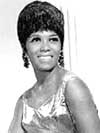

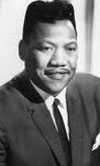
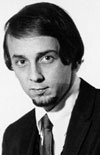
[Description by Uncle Ricky from notes by contributor Don Kent]
This is Hour 30 of the First and Original History Of Rock And Roll, as broadcast by KHJ/Los Angeles between 5PM and 6PM on Saturday, February 22, 1969. Our host is Robert W. Morgan. This hour bridges 1959 and 1960.
The original recording by Don Kent was severely damaged by technical problems and static, so this exhibit has been restored with the generous contribution of a close-generation dub of the original program master by The Norm Garr Collection. The should-have-been-ten-minute Marv Howard newscast has been edited to remove large sections of giant clicks, pops and volume dropouts.
This was the first “Rockumentary”, produced by KHJ Program Director Ron Jacobs. Following the unprecedented success of this legendary broadcast, Jacobs left KHJ later that year. RKO made the show available to the other stations in their group, narrated by station-specific talent. When RKO was done with it, Drake-Chenault offered a re-recorded version in syndication three times between 1970 and 1982. An edited version (no jingle) of the last release, narrated by Bill Drake, was still in syndication as of 2006.
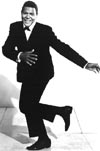
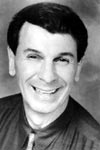
This is Hour 29 of the First and Original History Of Rock And Roll, as broadcast by KHJ/Los Angeles between 4PM and 5PM on Saturday, February 22, 1969. Our host is Robert W. Morgan.
This hour jumps around a 1958 – 1960 timeframe, featuring comments from the songwriting team of Jerry Leiber and Mike Stoller. Comments from Bo Diddley, The Everly Brothers, and Duane Eddy are also included.
This was the first “Rockumentary”, produced by KHJ Program Director Ron Jacobs. Following the unprecedented success of this legendary broadcast, Jacobs left KHJ later that year. RKO made the show available to the other stations in their group, narrated by station-specific talent. When RKO was done with it, Drake-Chenault offered a re-recorded version in syndication three times between 1970 and 1982. An edited version (no jingle) of the last release, narrated by Bill Drake, was still in syndication as of 2006.
